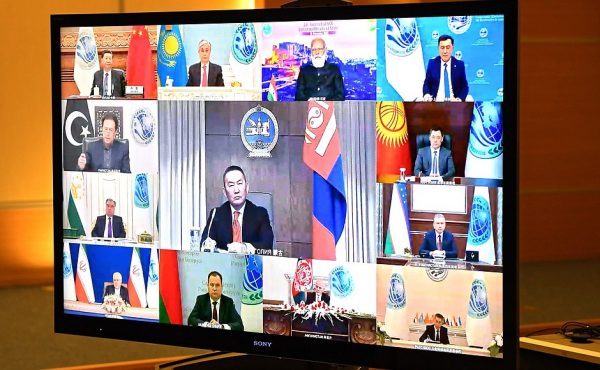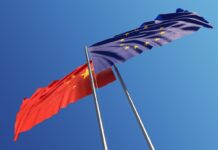On November 10, Uzbek President Shavkat Mirziyoyev participated in the virtually held Shanghai Cooperation Organization (SCO) Heads of State meeting. The appearance was his fourth since coming to power and his address this year was notably different from his previous statements. It also contrasted sharply with statements made by his predecessor, Islam Karimov, in the same format. Mirziyoyev’s emphasis at the SCO has been increasingly economic over the years while his predecessor staunchly stuck to a security agenda. Mirziyoyev’s emphasis on economic matters reflects the convergence of his domestic priorities with foreign policy to promote economic cooperation among SCO members to Uzbekistan’s benefit.
In his more recent speech, Mirziyoyev focused on economic projects and cooperation among the SCO member countries. Instead of using vague language to make his point, he proposed to eliminate trade barriers, simplify customs procedures, and boost investment. In a way, Mirziyoyev was appealing to the SCO’s larger economies to open their borders and markets. Nothing was said about reciprocity and Uzbekistan opening its markets and lifting its high import tariffs.
Strong language for joint economic and investment projects from member countries first appeared in the Ufa Declaration adopted in July 2015, which said that “The member states reaffirm the need for joint actions aimed at achieving sustainable socio- economic growth, intensifying trade, economic and investment activity, developing cooperation in high-tech sectors …” While Mirziyoyev’s own move toward stressing economic issues is also a reflection of the organization’s overall strides in this direction, the addresses of other presidents and heads of governments stayed mainly on security matters (see here for the statements from Kazakhstan, Kyrgyzstan, Tajikistan, India, and Pakistan).
On Tashkent’s agendas — both domestic and foreign policy — security issues have begun to fall behind economic concerns. With little threat from terrorism at home and Afghanistan’s Taliban recently pledging not to invade the territory of Uzbekistan or any other neighboring countries, Tashkent has room to think about other priorities such as the economy.
Comparing Karimov’s last address to the SCO in 2016 and the one Mirziyoyev gave several days ago, the differences could not be starker. Karimov focused on the non-alignment of Uzbekistan with any blocs, concerns and challenges associated with the expansion of the SCO to include India and Pakistan, and the potential spread of instability in Afghanistan to Uzbekistan.
Karimov’s concerns around the membership of India and Pakistan, with their protracted border issues, were not surprising. Add to that the fresh China and India border clash this May and the late president’s concerns seem valid. The testy addresses of the prime ministers of Pakistan and India at the recent meeting are just some examples of how difficult consensus is within the SCO’s current mix.
In taking an economic angle, Mirziyoyev is deftly maneuvering around the weaknesses evident in the SCO. While it might look like the SCO is turning into another regional economic organization, there is no certainty that the SCO will become a strong economic vehicle. For decades Central Asian countries have been economically cooperating with China bilaterally in ways that have satisfied all sides.. Even India, though less active than China, has plans for more active cooperation with Central Asian states outside the SCO on transportation issues.
Economic issues over the years have slowly moved up from the last item on the agenda to a priority item, especially for Uzbekistan. Bringing Russia, China, India, and Pakistan, whose views and priorities could not be more starkly different, into a single organization puts the organization on a shaky foundation. The SCO, as a regional organization, might not have a viable future. Countries like Uzbekistan would like to get the most out of it by nudging the agenda into economic realm while the club is still meeting.










